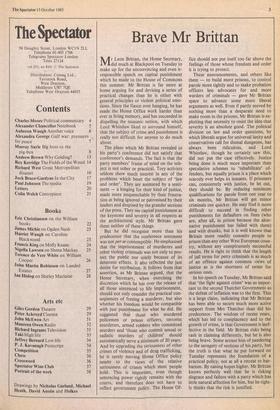Brave Mr Brittan
Mr Leon Brittan, the Home Secretary, did much at Blackpool on Tuesday to make up for the unconvincing and even ir- responsible speech on capital punishment which he made to the House of Commons this summer. Mr Brittan is far more at home arguing for and devising a series of practical changes than he is either with general principles or violent political emo- tions. Since the fiasco over hanging, he has made the Home Office work harder than ever in living memory, and has succeeded in dispelling the miasmic notion, with which Lord Whitelaw liked to surround himself, that the subject of crime and punishment is really too difficult for anyone to do much about.
The plans which Mr Brittan revealed to his party's conference did not satisfy that conference's demands. The fact is that the party members' frame of mind on the sub- ject is not sober or practical. Tory activists seldom show much interest in any of the problems which beset the subject of law and order'. They are animated by a senti- ment — a longing for their kind of justice, made more unquenchable by their frustra- tion at being ignored or patronised by their leaders and despised by the grander sections of the press. They see capital punishment as the keystone and severity in all respects as the architectural style. Mr Brittan gave them neither of these things.
But he did recognise more than his predecessor that the conference sentiment was not per se contemptible. He emphasised that the imprisonment of murderers and other violeru criminals was not only to pro- tect the public nor solely because of its deterrent effects. It also reflected the just desire for retribution. It follows from that assertion, as Mr Brittan argued, that the Home Secretary, when exercising the discretion which he has over the release of all those sentenced to life imprisonment, should not only consider the practical con- sequences of freeing a murderer, but also whether his freedom would be compatible with just punishment for what he did. He suggested that those who murdered policemen or prison officers, terrorist murderers, armed robbers who committed murders and 'those who commit sexual or sadistic murders of children' should automatically serve a minimum of 20 years. And by upgrading the seriousness of other crimes of violence and of drug trafficking, he is surely moving Home Office policy nearer to the views of the relative seriousness of crimes which most people hold. This is important, even though sentencing power rightly remains with the courts, and therefore does not have to reflect government policy. The Home Of-
fice should not put itself too far above the feelings of those whose freedom and order it is trying to protect.
These announcements, and others like them — to build more prisons, to control parole more tightly and to make probation officers less advocates for and more warders of criminals — gave Mr Brittan space to advance some more liberal arguments as well. Even if partly moved by nothing more than a desparate need to make room in the prisons, Mr Brittan is ex- ploiting that necessity to resist the idea that severity is an absolute good. The political division on law and order questions, by which liberals argue for universal laxity and conservatives call for dismal dungeons, has always been ridiculous, and Lord Whitelaw, though he certainly saw this, did not put the case effectively. Justice being done is much more important than speculative schemes to `rehabilitate' of- fenders, but equally prison is a place which scarcely ever helps its inmates. If prisoners can, consistently with justice, be let out, they should be. By reducing minimum qualifications for parole from one year to six months, Mr Brittan will get minor criminals out quicker. He may find it more difficult to succeed in finding other punishments for defaulters on fines (who are, after all, in prison because the alter- native punishment has failed with them) and with drunks, but it is well known that Britain more readily commits people to prison than any other West European coun- try, without any conspicuously successful results. He is right to think that the length of jail terms for petty criminals is as much of an offence against common views of justice as is the shortness of terms for serious ones.
In his speech on Tuesday, Mr Brittan said that 'the fight against crime' was as impor- tant to the second Thatcher Government as the defeat of inflation was to the first. This is a large claim, indicating that Mr Brittan has been able to secure much more active support from Mrs Thatcher than did his predecessor. The wisdom of recent years, which has led to complacency and to the growth of crime, is that Government is inef- fective in the field. Mr Brittan risks being rash in claiming differently, but he is also being brave. Some accuse him of pandering to the savagery of sections of his party, but the truth is that what he put forward on Tuesday represents the foundation of a practical policy, not at all a retreat to bar- barism. By raising hopes higher, Mr Brittan knows perfectly well that he is risking disgrace and failure with a party which has little natural affection for him, but he right- ly thinks that the risk is justified.










































 Previous page
Previous page